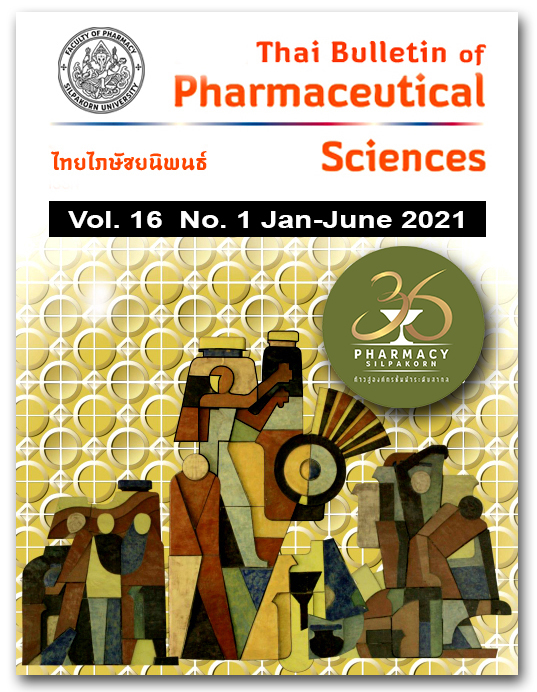A SURVEY OF ILLEGAL WEIGHT-LOSS DIETARY SUPPLEMENTS ADVERTISEMENT AT ONE ONLINE SHOPPING WEBSITE
DOI:
https://doi.org/10.69598/tbps.16.1.31-43Keywords:
Advertisement, Dietary supplement, Weight-lossAbstract
Internet advertising is highly popular due to its effectiveness at reaching targeted audiences. This descriptive study’s objective was to analyze the content of advertisements for weight-loss dietary supplements on one online shopping website. In December 2015, data were collected by searching three keywords—“weight loss,” “firming,” and “fat reduction” on one online shopping website, and the legality of the advertising content was analyzed. The search found 330 weight-loss dietary supplements being advertised. Searches using the keyword “fat reduction” brought up the highest number of advertised products. (56.06%) This expression was found in the wording of most of these advertisements. (64.85%). 97.58% of advertisements for these types of products were illegal. The highest level of illegal advertising was for products in the group that claimed to aid weight loss (98.33%). The following 7 types of statements were the most commonly found in ads: (1) statements that claimed to have an effect on weight loss, or on diet were the most frequently found type (89.4%), followed by statements that (2) claimed to have an effect on the formation of body structure, organ function or the functional system of the body, (3) statements that made claims about figure fitting, fat trapping or any other similar statements, (4) statements that included words that are not permitted to be used in food advertising, (5)statements that made claims about skin or beauty nourishment (6) statements that claimed to be able to cure, relieve, treat or prevent diseases or sickness or the symptoms of diseases and (7) statements by medical professionals that recommended, supported, or praised the benefits or qualities of the food supplements. The findings showed that nearly all of the advertisements for weight-loss dietary supplements contained illegal content. Therefore, the relevant agencies need to inform consumers and promote awareness through campaigns in the media, to protect consumers against illegal content in dietary supplement advertising.
References
Kitchanapaibul S. Improper weight loss behavior among Thai adolescents and young adults. Nurs J. 2012;39(4):179-90. (in Thai)
Sareerat S. Marketing strategy and marketing management. Bangkok: Diamond in Business World; 1998. (in Thai)
Thitijirawith W. Online Media exposure behavior affects purchasing decision of supplement beauty product [master's thesis]. Bangkok: Bangkok University; 2018. (in Thai)
Ministry of Digital Economy and Society. National Statistical Office Thailand. The important summary result of the 2018 household survey on the use of information and communication technology (quarter 1) [Internet]. Bangkok: The Office; 2018 [cited 2020 June 1]. Available from: http://www.nso.go.th/sites/2014/DocLib13/ด้านICT/เทคโนโลยีในครัวเรือน/2561/ict61-สรุปผลที่สำคัญ_Q1.pdf (in Thai)
Ministry of Digital Economy and Society. Electronic Transactions Development Agency. Thailand internet user behavior 2019. Bangkok: The Agency; 2020 [cited 2020 June 1]. Available from: https://www.etda.or.th/th/Useful-Resource/publications/Thailand-Internet-User-Behavior-2019_Th.aspx (in Thai)
Vantamay N. Principles of advertising. Bangkok: Kasetsart University Press; 2011. (in Thai)
Sanawee K. Media Exposure and Media Literacy of Youths in Bangkok Rajamangala University of technology Phra nakhon. [Research report]. Bangkok: Bangkok Rajamangala University of technology Phra nakhon; 2011. (in Thai)
Theppharnomrat S. Information exposure consumer’s behavior opinions and purchasing decisions of dietary product on online media of Bangkok metropolitan citizens. Siam Commun Rev. 2015;14(17):104-12. (in Thai)
Sampatpong P. Consumer’s buying decision behavior on supplementary food in Nonthaburi Province. Bangkok: Rajapruk University; 2017. (in Thai)
Chinthanorm K. Perception of importance of factors influencing the credibility of health-related websites [master's thesis]. Bangkok: Chulalongkorn University; 2008. (in Thai)
Prapprasri T, Kruawong P. The behaviors of consuming supplementary food of students Kamphaeng Phet Rajabhat University MaeSot. In: 12th Naresuan university Research confercence; 2016 Jul 21-22; Pitsanulok, Thailand [internet]. Pitsanulok: Naresuan University; 2016. p.1439-51 [cited 2020 June 1]. Available from: http://.nu.ac.th/nrc12/downloadPro.php?pID=222&file=222.pdf (in Thai)
Chonwihan W. Prevalence of inappropriate use of health products for weight control among female teenagers in Saraburi Province and factors affecting it. Thai J Pharm Pract. 2016;8(2):442-55. (in Thai)
Food Act B.E. 2522. Royal Gazette. Number 96; Section 79 (1979 May 13) [Internet]. [cited 2020 June 1]. Available form: http://www.ratchakitcha.soc.go.th/DATA/PDF/2522/A/079/1.PDF (in Thai)
Food and Drug Administration Announcement: Criteria for Food advertisement B.E. 2561. Royal Gazette. Number 135; Special section 322 D (2018 Dec 17) [Internet]. [cited 2020 June 1]. Available form: http://www.ratchakitcha.soc.go.th/DATA/PDF/2561/E/322/T_0011.PDF (in Thai)
Food and Drug Administration. Thailand FDA reveals statistic surveillance of illegal health product [Internet]. Nonthaburi: FDA; 2019 [cited 2020 June 1]. Available form: https://www.fda.moph.go.th/Shared%20Documents/News/ปีงบประมาณ%202563/ข่าวแจก%20019%20ปีงบประมาณ%202563/อย.%20เผยสถิติเฝ้าระวัง%20ตรวจสอบ%20ผลิตภัณฑ์สุขภาพผิดกฎหมาย.pdf (in Thai)
Foundation for consumer. Foundation for consumer reveals exaggerated advertising appeals is the most appeals in 2019 [Internet]. Bangkok: The Foundation; 2020 [updated 2020 Jan 14; cited 2020 June 1]. Available form: http://www.indyconsumers.org/main/products-service-150/1166-complaint14-1-63.html (in Thai)
Panya A. A framework for building trust in B2C E-commerce based on consumer's viewpoint in Thailand [master's thesis]. Chiang Mai: Chiang Mai University; 2015. (in Thai)
Meearsar S. Website brand quality components of E-marketplace in Thailand [dissertation]. Bangkok: Siam University; 2015. (in Thai)
Prakhamsriwong D. Utilization of online weight reduction information of female citizen [master's thesis]. Chiang Mai: Maejo University; 2014. (in Thai)
Wattanopas T. The factors influencing customers trust including online advertising and involvement [master's thesis]. Bangkok: Bangkok University; 2018. (in Thai)
Witchakit N, Chaynuk A. Legal measure regarding control of advertisement of health product and beauty products on internet. SDU Grad J. 2014;10(1):269-76. (in Thai)
Weerasomwong H. Legal measure in case of the control of advertising on weight loss supplement via social media. [master's thesis]. Bangkok: Sripatum University; 2017. (in Thai)
Rattanapongjinda N, Plianbangchang P. Survey of weight-loss product advertisements on the internet. J Health sci. 2012;21(4):741-9. (in Thai)
Downloads
Published
How to Cite
Issue
Section
License
All articles published and information contained in this journal such as text, graphics, logos and images is copyrighted by and proprietary to the Thai Bulletin of Pharmaceutical Sciences, and may not be reproduced in whole or in part by persons, organizations, or corporations other than the Thai Bulletin of Pharmaceutical Sciences and the authors without prior written permission.



